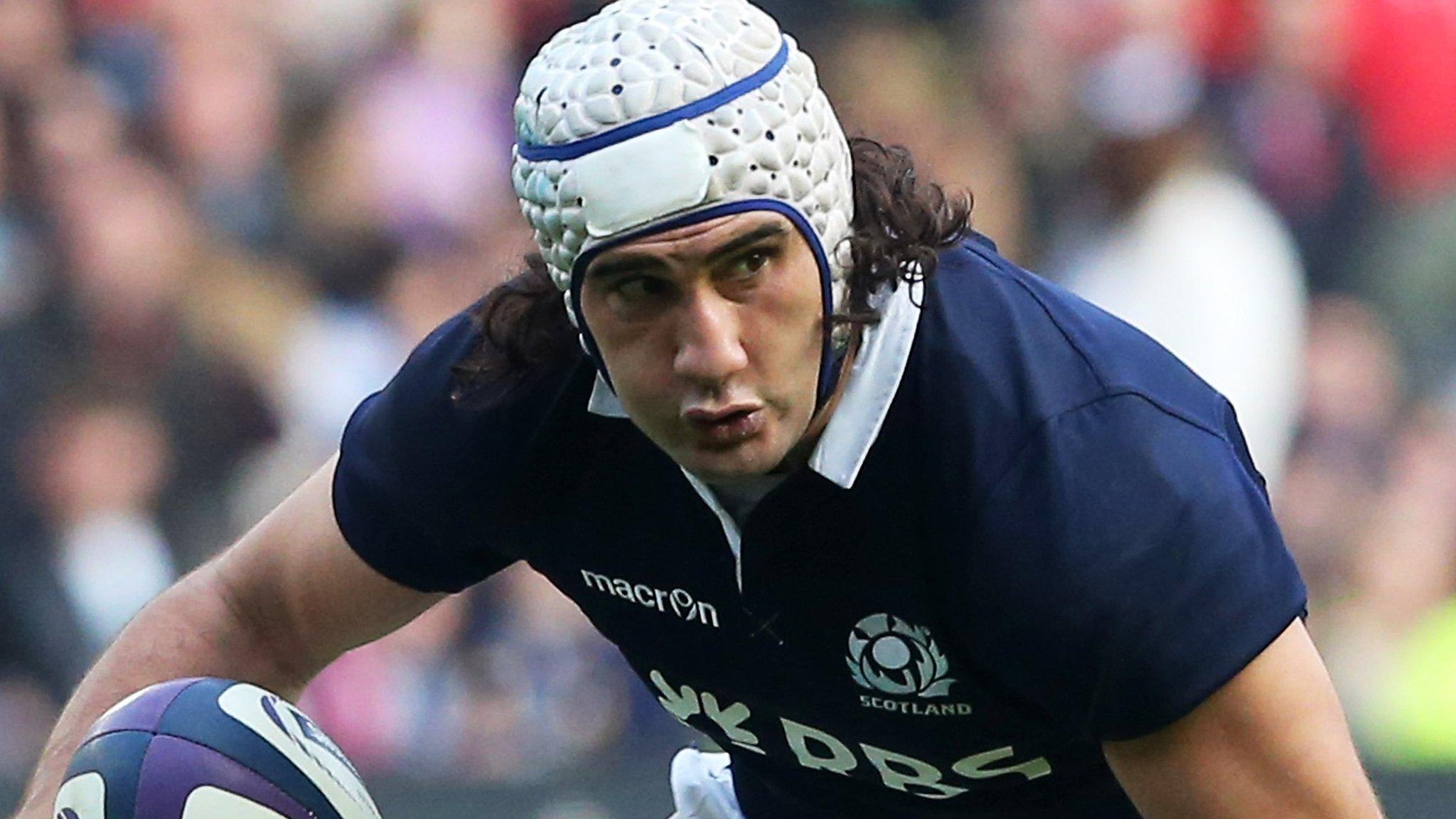Scotland v Georgia: We need an expanded Six Nations, says Georgia boss
- Published
- comments
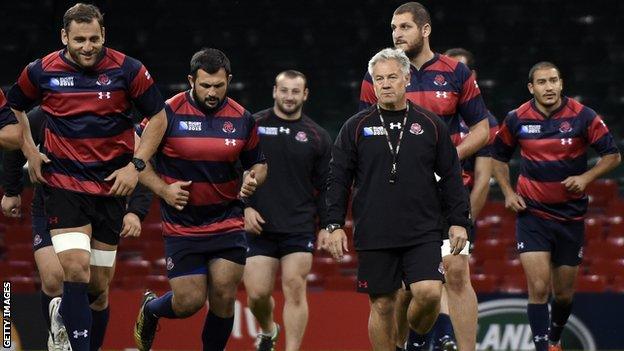
Milton Haig, front, believes his side can add to an expanded Six Nations Championship on and off the field
Autumn international: Scotland v Georgia |
|---|
Venue: Rugby Park Date: Saturday, 26 November Kick-off: 14:30 GMT |
Coverage: Watch live on BBC Television, online, tablets, mobiles and BBC Sport app; listen on BBC Radio Scotland; text commentary on BBC Sport website. |
Georgia head coach Milton Haig believes his side merit a place in an expanded Six Nations Championship, and says Tier Two nations are "fighting for scraps" in the battle to earn fixtures against top opposition.
Haig's side have won the past six European Nations Cup (ENC) titles - the division below the Six Nations - finished third in their 2015 World Cup pool and completed an unbeaten Pacific Islands tour this summer.
There is no imminent prospect of a change to the Six Nations format, despite alterations to rugby's international calendar after the 2019 World Cup.
But Haig believes the status quo is hampering Georgia's development, and their World Cup preparations.
"Absolutely, we've outgrown the ENC," Haig told BBC Scotland. "You're not being disrespectful to the other teams - you're saying the obvious.
"That's why we've started being public about our desire to get into an expanded Six Nations. Not a promotion/relegation system, that's never been our standpoint, it's always been that the Six Nations gets expanded to seven or eight teams, depending on what the current partners feel is applicable."
The New Zealander argues:
Georgia, ranked 12th in the world, are struggling to take their development to the next level without regular Tier One opposition
Expanding the Six Nations from six to seven teams would not exceed the window for international matches
There is a "massive potential market" for rugby in eastern Europe
Haig also says the Georgian union has been approached by Pro12 league to discuss the incorporation of a professional Georgian team
And with the backing of a billionaire former prime minister, he believes Georgian rugby boasts facilities unrivalled anywhere in the world
'Fighting for scraps'
Almost every Tier Two nation agitates for more frequent fixtures against the Six Nations and Rugby Championship heavyweights, but Georgia's case for greater challenges is compelling.
The glaring extent of their supremacy in the ENC can be outlined thus: in the last six championships, they've lost just two matches from the 30 played. Their cumulative points difference reads: for 948, against 264.
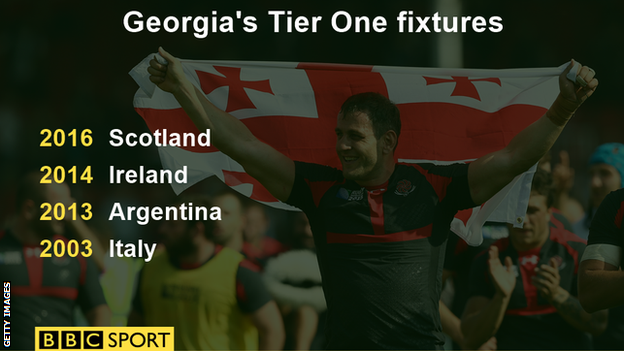
Georgia's November meeting with Scotland will be just their fourth match against Tier One opposition outside the World Cup in 13 years
Georgia have lost only once since last year's World Cup - a narrow defeat by Japan - and completed an unbeaten Pacific tour of Tonga, Fiji, and Samoa this summer. Last weekend, they beat the touring Samoans in Tbilisi.
A Tier One nation has never played a Test in Georgia, and outside World Cup pool matches, their fixture with Scotland on 26 November will be only the fourth time in 13 years the Lelos have had the opportunity to pit themselves against top-class opposition.
"How can you improve [in that situation]? You can't," says Haig.
"The Test schedule for the Tier Ones is already done up to 2019, and the big boys sit around the table and work out a deal.
"Effectively there are a couple of weekends free to be filled with Tier Two teams. Then we go to a meeting, all the Tier Two guys go into a room and everybody scraps over what's left.
"We all have fisticuffs about who's getting what. I'm being facetious to some degree, but that's not too far away from what happens.
"It's not easy - that's the summary of that conversation. It's just not easy for Tier Two teams to get more than one or two Tests every year against Tier One teams.
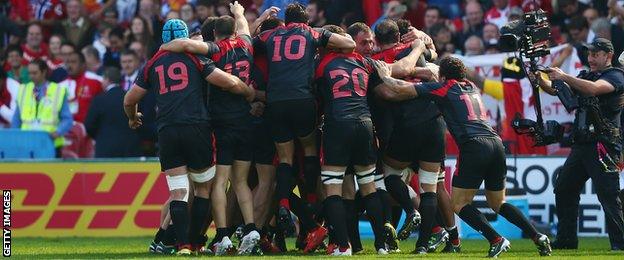
Georgia beat Tonga and Namibia in the 2015 World Cup to finish third in Pool C and automatically qualify for the 2019 finals
"I'm not saying World Rugby doesn't look after us, they've been very good to us and helped us develop, but we need more.
"The challenge is that every Tier Two team says they want more, but it's how you prioritise that that's going to be key."
'One more seat at the table'
Alterations to the present Six Nations format have long been mooted - outgoing World Rugby president Bernard Lapasset called for a promotion/relegation play-off, with the ENC winners playing the team that finishes bottom in the Six Nations, as he left office in April.
That seems a fair proposal on the face of it, but Haig says Georgia have to be cannier in their demands.
"The reality is, if you were one of those six partners, not one would want to put their seat in jeopardy, and if it was me sitting in their position, I wouldn't either," says the New Zealander.
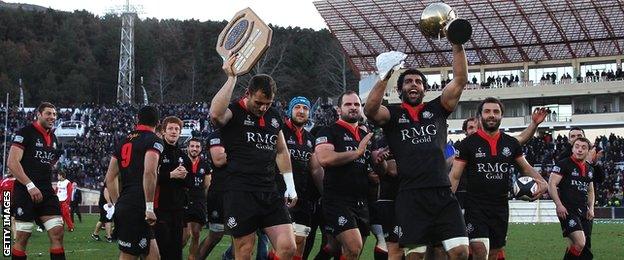
Georgia have won the second-tier European Nations Cup for six consecutive seasons
"But if you go to the negotiating table and don't have any cards to play, you've then got to say, 'there's no threat here of anybody losing their seat, all we're asking for is you put one more seat at the table'.
"I think for us, that's the smarter way to go. It's also less threatening to the existing partners and it means they're helping to grow the game in eastern Europe.
"There's a massive potential market in eastern Europe, and we would say by including Georgia, or Romania or Russia, you might be able to capitalise on that."
Better rugby - and more of it
The prospect of a global season, a closer alignment of the northern and southern hemisphere calendars, has been hotly debated, but Haig fears that scenario would only condense the international windows, and thereby reduce the already scant opportunities for Georgia to take on the "big boys".
"We feel if we can't get World Rugby giving us more Tier One Tests, then the obvious solution would be for us to be included in an expanded Six Nations," he says.
"Automatically, you get six more Tier One games. And it wouldn't have to go outside the current Test windows.
"It would fit into both our calendar and the Six Nations calendar. Nothing has to change, apart from the fact we'd get much better rugby.
"And with much better rugby consistently, we'd perform better at a World Cup. That's where we see our future, and that's where we'll keep having those conversations."
Pro12 possibilities
Domestically, there is broad scope for growth. Georgia, says Haig, is a nation where rugby is on a rapid upward trajectory, and sell-out Tbilisi crowds of 50,000-plus for ENC fixtures are the norm.
But in his 30-man November squad, over half play their club rugby in France or England, rather than the semi-professional Georgian leagues.
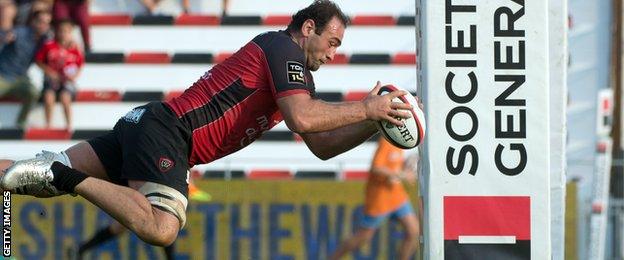
Georgian captain and top try-scorer Mamuka Gorgodze has spent almost his entire club career in France
Meanwhile, as they seek innovative methods to combat Anglo-French wealth, the Pro12 league's representatives have been exploring opportunities to incorporate North American teams or franchises.
The New Zealander says they've made enquiries with the Georgian union too - and those enquiries are most welcome.
"Our union has been approached by the Pro12 - it was just the initial discussions, but we've indicated that absolutely we'd love to have a team in that competition," he says.
"We're trying to put our players, whether at international or local level, into better competitions, so that they learn the game and get better.
"It's a pathway for our younger players as well. To have a fully professional team in a competition like that, would do us wonders.
"That's an obvious step that we'd like to continue conversations so that hopefully we can within a couple of years get that up and running."
Billionaire benefactor
The Georgian game has one vital fillip, absent from many of its Tier Two counterparts, that may help smooth its ascent - money.
Where the Pacific teams of Fiji, Samoa and Tonga are hampered by modest revenue and ramshackle infrastructure, Georgian rugby is bankrolled by former prime minister, Bidzina Ivanishvili.
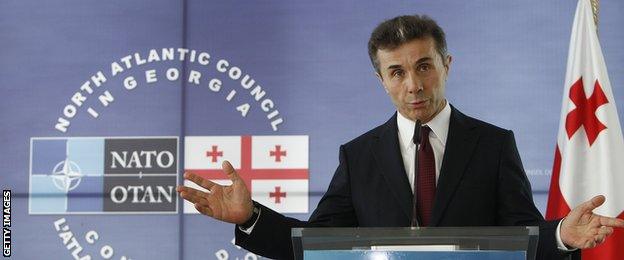
The billions of former prime minister Bidzina Ivanishvili are bankrolling Georgian rugby
Forbes Magazine puts Ivanishvili's net worth at $4.8bn (£3.89bn). That's over $1bn more than US president-elect Donald Trump ($3.7bn), and just shy of Richard Branson ($4.9bn).
In almost five years as head coach, Haig has never actually met the man whose wealth is propelling his vision, but its impact is apparent everywhere.
"When I first came here and saw our high-performance base, not even New Zealand had something like that, and probably still doesn't," says Haig.
"We have our own 27-room hotel, swimming pool, commercial kitchen, gymnasium, grandstand, one artificial field, one natural field, fully-lit to international standards.
"It's incredible what we've got here, and we've continued to improve our high-performance centre.
"We've just built a 14x14m fully-covered wrestling dojo that we do a lot of our contact work in.
"Prior to the World Cup, I said, it'd be great if we had this, because it'll help us get better, and bang - it was built in 10 minutes. When you have the ability to do that, it helps everything we're doing.
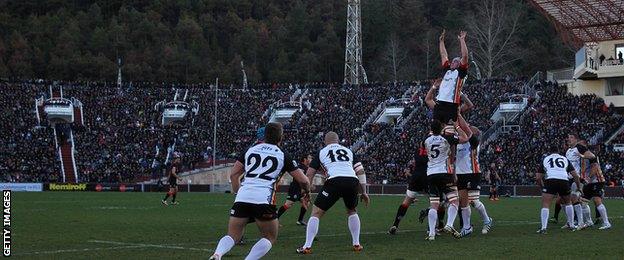
Tests in Tbilisi can draw crowds of over 50,000
"He's not at all a rugby fanatic. He's a very private man. He understands what rugby's doing for the country and the people, and that's why he's happy to invest in the infrastructure, and our day-to-day costs are always covered by the government.
"If we've got the opportunity to be sitting at that Six Nations table, it becomes a whole different landscape for Georgian rugby.
"And I'd be pretty confident that whatever was necessary in terms of funding or building more infrastructure, he'd be the first to put his hand up and say, yes, we can do that."
'We're confident it's going to happen'
Haig remains upbeat that as he continues to add tactical nous, game understanding and more polished skill-sets to the historically formidable physical profile of the Georgian squad, and its momentum continues to snowball, there is light at the end of the tunnel.
He sees parallels with Argentina, whose case for top-tier rugby eventually grew so irrefutable that they were invited to join the Rugby Championship in 2012 and Super Rugby in 2016, with most of their Test squad contracted to Buenos Aires-based franchise, the Jaguares.
And Haig is increasingly reassured by what he perceives to be a change in attitude among the powers-that-be - he says the notion of a bigger Six Nations no longer seems so distant.
"Rugby in Georgia just keeps growing," says Haig. "Player numbers for kids are growing; it's getting bigger and bigger.
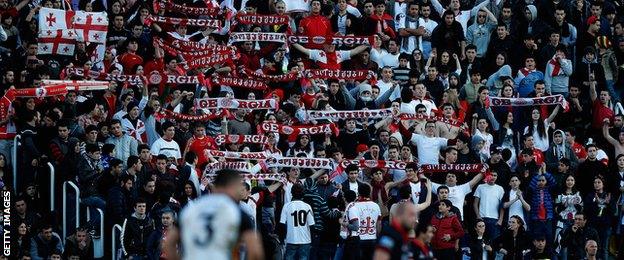
Haig says the popularity of rugby in Georgia is growing at a rapid rate
"As we build more infrastructure throughout the country, more stadiums, more fields, it's the old adage - if you build it, they will come, and that's been the mantra for us.
"If one of those top nations came to Georgia to play, I can guarantee you we'd be packing out the biggest stadium in Georgia, and it'd be an atmosphere they maybe hadn't experienced for some time.
"I understand that London, Paris, Rome, are all very nice places, but again I think if you are a touring team or tourist coming to play or watch a game in Tbilisi will be an experience you probably haven't had before.
"We're certainly pretty confident within the next four or five years, it's going to happen.
"And the first time it does, it's going to be a big occasion for the country. That's what we keep holding onto - that one day, it's going to happen, and for our country that'll be awesome."
- Published24 November 2016
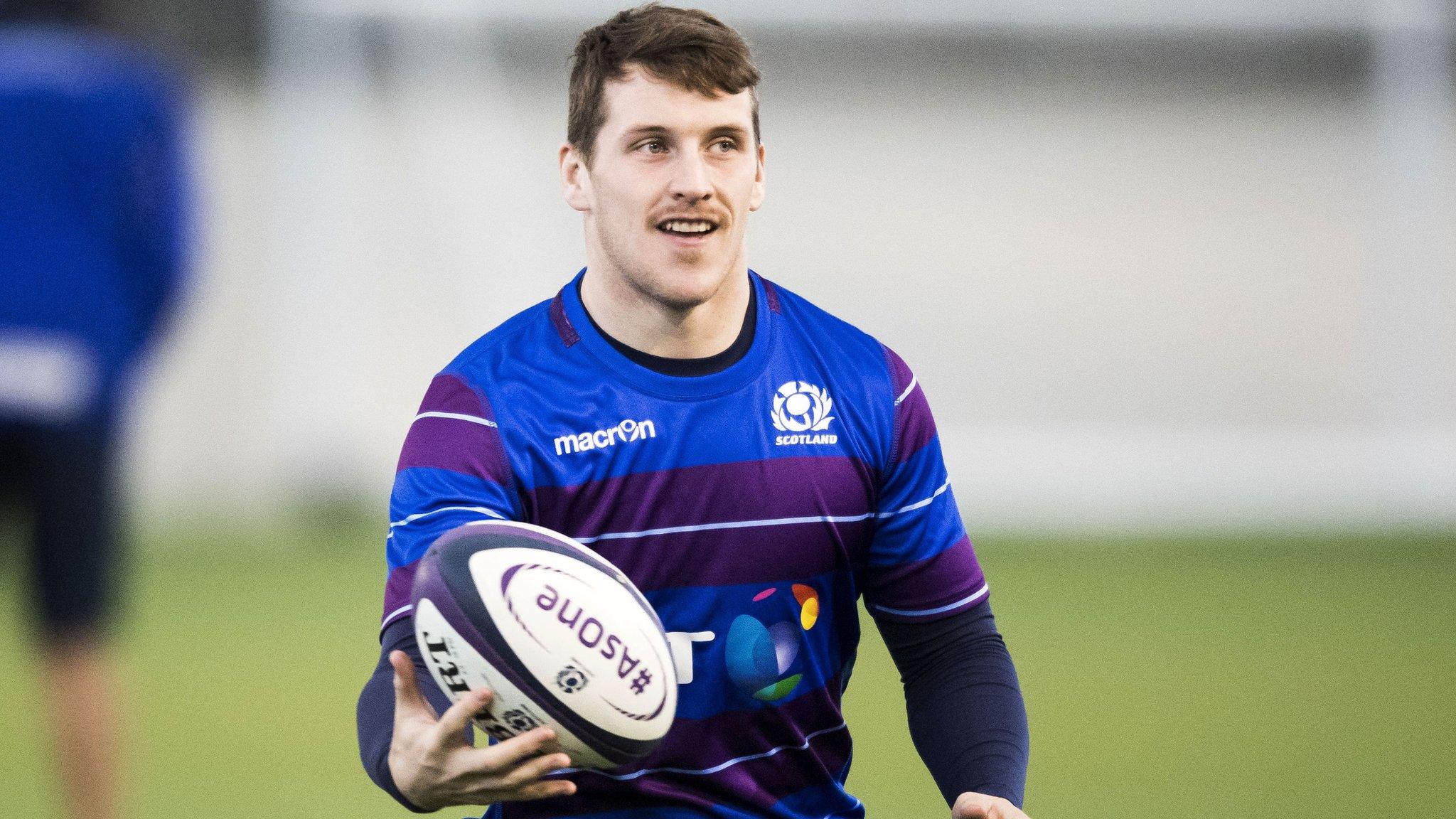
- Published22 November 2016
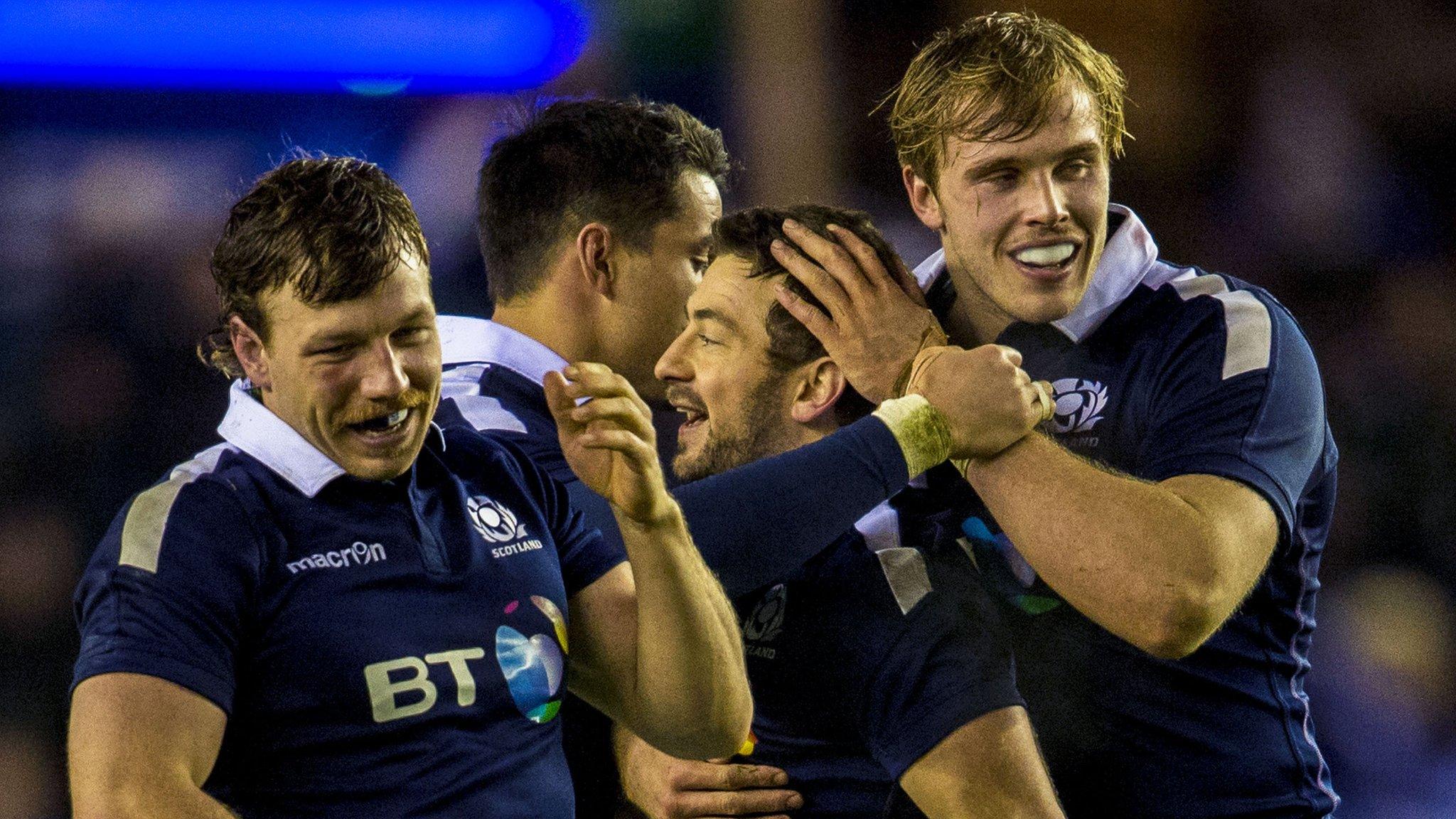
- Published22 November 2016
